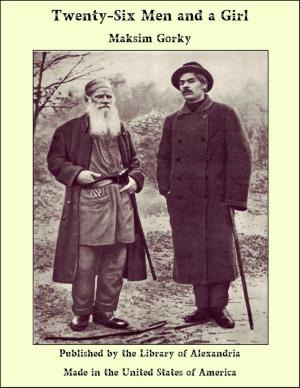The Underground World: A Mirror of Life Below the Surface
Nonfiction, Religion & Spirituality, New Age, History, Fiction & Literature| Author: | Thomas Wallace Knox | ISBN: | 9781465621597 |
| Publisher: | Library of Alexandria | Publication: | March 8, 2015 |
| Imprint: | Language: | English |
| Author: | Thomas Wallace Knox |
| ISBN: | 9781465621597 |
| Publisher: | Library of Alexandria |
| Publication: | March 8, 2015 |
| Imprint: | |
| Language: | English |
In these days of fast presses, cheap books and newspapers, lightning telegraphs, and other disseminators of intelligence, there may be those who doubt the correctness of the adage which says, “One half the world does not know how the other half lives.” Human nature is inquisitive. We are constantly seeking information regarding the affairs of others, and we generally manage in some way to obtain what we seek. We store our minds with useful and useless knowledge of the manners and customs of people in other lands, and of the private lives and histories of our near neighbors. Very often the material we thus lay aside in our mental store-houses does not particularly concern us, but, like Mrs. Toodles, in her purchase of a door-plate bearing the name of Thompson with a p, we think it will be handy to have at some future day, and so we keep it. With a fair devotion to inquiries, and a well-cultivated memory, a life of threescore and ten years ought, at this day, to acquaint its possessor with a general knowledge of the how and why of the existence of at least half the inhabitants of the globe. But it may be set down as an axiom, that one half the world does not live as the other half does. People’s tastes differ, and there are very few who would wish to live exactly like others, especially if those to whom the choice is offered are richer than the others. There are many who would not change places with their wealthy neighbors, and it is more than probable that their wealthy neighbors would not change places with them. The majority of sailors are not happy when on shore, but are constantly sighing for a wet sheet and a flowing sea, while the majority of landsmen have no desire for such hydropathic experience. When Mungo Park travelled in Africa, the natives expressed great pity for him because he had lost his color; they constantly mourned over the unhappy lot of the white man, and would have been quite unwilling to change complexions with him. Mungo received their sympathy with a countenance becomingly solemn, but the chances are more than even that what they regarded as a misfortune was by him considered a blessing. “Give me a bed of ice and a pillow of snow,” said a moribund Laplander in Italy, “and I shall die happy.” A refrigerating couch of this kind would be comfortless in the extreme to a countryman of Pauline Borghese.
In these days of fast presses, cheap books and newspapers, lightning telegraphs, and other disseminators of intelligence, there may be those who doubt the correctness of the adage which says, “One half the world does not know how the other half lives.” Human nature is inquisitive. We are constantly seeking information regarding the affairs of others, and we generally manage in some way to obtain what we seek. We store our minds with useful and useless knowledge of the manners and customs of people in other lands, and of the private lives and histories of our near neighbors. Very often the material we thus lay aside in our mental store-houses does not particularly concern us, but, like Mrs. Toodles, in her purchase of a door-plate bearing the name of Thompson with a p, we think it will be handy to have at some future day, and so we keep it. With a fair devotion to inquiries, and a well-cultivated memory, a life of threescore and ten years ought, at this day, to acquaint its possessor with a general knowledge of the how and why of the existence of at least half the inhabitants of the globe. But it may be set down as an axiom, that one half the world does not live as the other half does. People’s tastes differ, and there are very few who would wish to live exactly like others, especially if those to whom the choice is offered are richer than the others. There are many who would not change places with their wealthy neighbors, and it is more than probable that their wealthy neighbors would not change places with them. The majority of sailors are not happy when on shore, but are constantly sighing for a wet sheet and a flowing sea, while the majority of landsmen have no desire for such hydropathic experience. When Mungo Park travelled in Africa, the natives expressed great pity for him because he had lost his color; they constantly mourned over the unhappy lot of the white man, and would have been quite unwilling to change complexions with him. Mungo received their sympathy with a countenance becomingly solemn, but the chances are more than even that what they regarded as a misfortune was by him considered a blessing. “Give me a bed of ice and a pillow of snow,” said a moribund Laplander in Italy, “and I shall die happy.” A refrigerating couch of this kind would be comfortless in the extreme to a countryman of Pauline Borghese.















